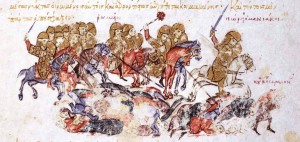Who was George Maniaces?
Like Athena bursting full grown from the brow of Zeus, George Maniaces- a giant ‘nearly ten feet tall with a voice like thunder’- first appears in the year 1030, aged 33.
Virtually nothing is known about his youth, but he was a wealthy land-owner in what is today modern Turkey, and was therefore probably educated in Constantinople. By 1030 he had risen to the rank of strategos or military governor of Telouch, a town just to the north of Aleppo. This was a relatively unimportant position since the province was the smallest on the Upper Euphrates, but it was a point of entry for Muslims raiding from Syria. In 1030 the Emperor Romanus III tried to put a stop to the raids, but was defeated near Telouch. The victorious Muslims claimed to have captured the Emperor and ordered Maniaces to surrender the city. He pretended to agree, sending them a generous portion of food and wine as a sign of his good intentions. But this was merely a ruse. He waited till the Muslims had indulged themselves, and then attacked when they were sleeping off the effects of the wine. All of the loot lost in the previous battle was recovered along with a sizable amount of Arab treasure (280 supply camels were captured). The ears and noses of the enemy dead were cut off and Maniaces immediately rode to the imperial camp where- in a brilliant PR move- he dumped the grisly trophies out in front of Romanus III.
He was promoted on the spot (as the new strategos of all the cities of the Euphrates), and began a grand offensive against the Muslim emirates of Syria. He quickly displayed the gifts which would make him famous. The major city of Edessa (modern Urfa) was attacked, and when it put up a stiff resistance, Maniaces bribed its governor into surrendering. A relieving Muslim army failed to evict him and three years later Maniaces was still able to send its annual tax of 50 pounds of gold to Romanus III.
While Maniaces was busy in the east, Italy was slipping out of the empire’s control. Sicilian Arabs invaded Calabria in 1032 and by 1037 managed to kill the imperial governor of Italy. Romanus III’s successor Michael IV ordered Maniaces to stabilize the situation and drive the Muslims from Sicily. Maniaces brought a formidable mercenary army which included the Viking hero Harald Hardrada and the Norman adventurer William Iron-Arm (whose brothers Guiscard and Roger would later conquer the island and found the Norman Kingdom of Sicily). He captured both Messina and Syracuse and was on the verge of restoring Sicily to Byzantium, but the temperamental aspects of his genius asserted themselves. He managed to offend most of his Lombard and Norman mercenaries by skimping on their share of the loot, and -far more seriously- he publicly humiliated his admiral who happened to be the brother-in-law of the most powerful member of the imperial court. In 1041 he was recalled on the charge of treason, but was saved by the death of the Emperor and the fact that all the gains in Sicily evaporated without him.
Unfortunately for Maniaces, he had powerful enemies. Though he was quickly sent back to Italy- and promoted to catepan (governor) of all Italy- the imperial court was now against him. This was mostly due an old rival- Romanus Sclerus- who owned several estates touching Maniaces’ property in Anatolia. There was no love lost between the two men (they had physically assaulted each other during a squabble over land) and Romanus was determined to undercut the general at every opportunity. While Maniaces was away, Romanus seduced his wife and then ransacked his house, making no attempt to conceal his actions. He then moved to the capital where he used his influence (his sister was the emperor’s mistress) to turn the court against Maniaces. The tactic worked. The emperor relieved Maniaces of command, and- in a move of stunning stupidity- chose Romanus Sclerus as the messenger to inform Maniaces of the development.
Any gleeful excitement Sclerus had at his triumph was short-lived. Maniaces reacted to the demand to turn over his forces by sealing Romanus’ eyes, ears, nose, and mouth shut with dung and then slowly torturing him to death. He then declared himself emperor and marched on Constantinople. In 1043 he reached Thessaloniki where he easily defeated the terrified imperial forces. Unfortunately for his adherents, however, the victory was a pyrrhic one. During the fighting he was struck with a chance blow and killed. With him died Byzantium’s ablest general and one of its most enigmatic figures- along with any chance for the empire to hold on to Italy.
